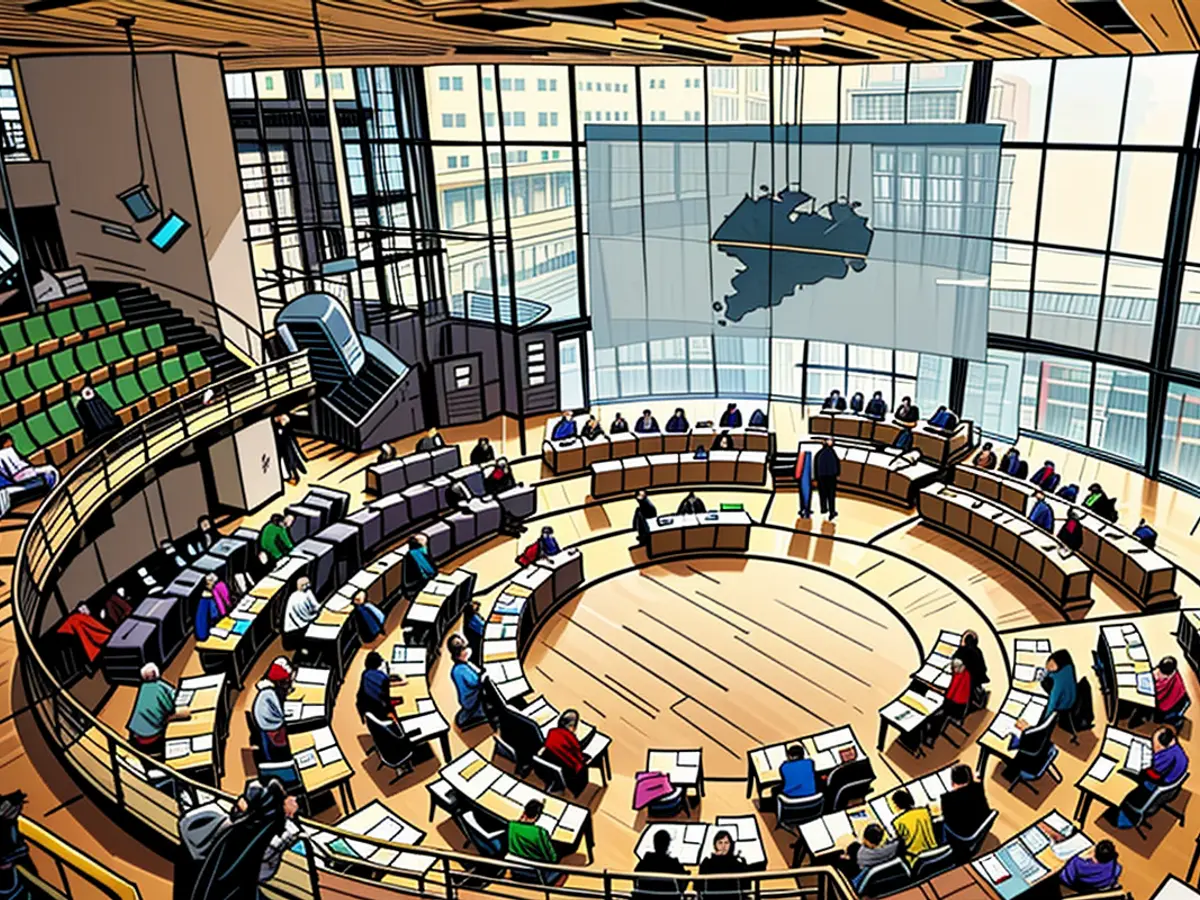- The Conservative Democratic Union (CDU) proposes an inquiry into alleged electoral manipulation.
Following the state election, the freshly elected parliament in Saxony is commencing its initial duties. On Wednesday itself, the CDU and SPD factions will conduct their inaugural meetings. Meanwhile, the CDU has begun exploring shared grounds with other parties for a potential coalition government.
As per announcements from party spokesperson Paul Schäfer, the CDU has extended invitations for talks to the Bündnis Sahra Wagenknecht (BSW), SPD, and the Greens. The AfD and the Left have been omitted. Their unsuitability has been resolved, thereby officially ruling out any collaboration with them.
Home Union rejects alliance with AfD, BSW, and Greens
The conservative Home Union within the Saxon CDU has declared its inability to envision a partnership with the AfD, BSW, nor do they favor the Greens as a possible coalition partner. Chairman Sven Eppinger, who secured a CDU seat in the recent vote, proposes "novel approaches to government policy." Although he refrains from mentioning minority government, the Home Union, under its previous name Values Union, had previously suggested such a model following the 2019 state election.
Investigation into election manipulations
The police have initiated investigations concerning alleged election tampering. Originally, around 100 tampered ballots were discovered in two Dresden electoral districts. Further manipulations have since been discovered in two electoral districts in Radeberg and again in Dresden. In all instances, unknown individuals had concealed the selected voting decision on mail-in ballots, replacing it with the far-right micro-party Free Saxony. The State Criminal Office is now overseeing the investigations.
AfD conducts review for software glitch in seat allocation
After a software glitch impacted the seat allocation for the new state parliament, the AfD has initiated a review process. AfD state and faction leader Jörg Urban stated, "We require a comprehensive understanding of the issue," emphasizing the need for an exact error analysis. "If any irregularities are detected, we will pursue legal action."
A software fault initially resulted in the incorrect allocation of seats for individual parties. After a review, the election committee corrected the seat allocation. As a result, the AfD now has 40 seats, losing its blocking minority, discouraging its ability to block certain decisions within the state parliament.
Constituent meetings for factions in the state parliament
The CDU will be represented in the parliament by 41 men and women, four fewer than in the beginning of the previous term. A CDU member later left the faction. The SPD enters the parliament with ten members, as in the previous legislative period. The Green faction plans to initiate its constitutive meeting on September 17, potentially electing new leadership. The Alliance Greens now have seven members, previously numbering twelve.
The Left plans to establish its faction on September 24. The delay is due to chairwoman Susanne Schaper's scheduled aid mission in Vietnam on that date. Schaper, a trained nurse, has regularly contributed to the Southeast Asian country. With six members, the Left now holds a reduced presence in the 8th Saxon State Parliament, with 14 members previously.
Only the AfD and the Alliance Sahra Wagenknecht (BSW) report expanded personnel
The AfD and the Alliance Sahra Wagenknecht (BSW), newcomers to the Saxony election, are the only parties reporting increased personnel. BSW has sent 15 members to the parliament, while the AfD has expanded its representation from 38 to 40 members, having lost four members during the previous term.
CDU politician Marko Schiemann remains the longest-serving member of the parliament. After the resignations of parliament president Matthias Rößer and his deputy Andrea Dombois (both CDU), Schiemann remains the sole continuous member since 1990. A renowned right-wing spokesperson for the CDU fraction and former Europe policy specialist, Schiemann is considered a key figure in the development of the Saxon constitution.
Potential alliance named: Blackberry Coalition
Although the coalition has not yet formed in Saxony, numerous obstacles must be overcome, a name has already been presented: the Blackberry Coalition. Due to the absence of a country using black (for CDU), red (for SPD), and purple (for the Alliance Sahra Wagenknecht) in its national flag, the concept is inspired by nature.
The blackberry is chosen as the namesake because it represents the party colors of the potential coalition partners in different stages of maturity. The term "Blackberry Coalition" was first introduced by political scientist Karl-Rudolf Korte in an essay.
In the recent Saxony state election, the Saxon Union came in first with 31.9% of the votes, narrowly surpassed by the AfD (30.6%). With CDU Minister President Michael Kretschmer ruling out cooperation with the AfD and the Left Party, the Union's only viable option is to form a coalition with BSW (11.8%) and SPD (7.3%) or BSW and the Greens (5.1%).
The Blackberry Coalition, proposed as a potential coalition name, includes the CDU, SPD, and the Alliance Sahra Wagenknecht (BSW). The Landtag has initiated an investigation into election manipulations, with several alleged instances of tampering discovered in various electoral districts.








